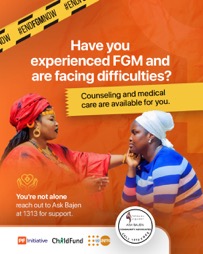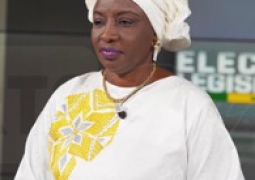
An influential women-led advocacy group and community advocate, Ask Bajen is a dynamic initiative of Paradise Foundation (PF) with the desire to empower women and girls as well as survivors of sexual and gender-based violence including the deeply rooted cultural and traditional practice of FGM/ C.
The Foundation states that almost three-quarters of women and girls aged between 15 and 49 in The Gambia have undergone FGM. It says 65% of the majority underwent FGM before the age of five, with an additional 18% undergoing FGM between the ages of five and nine years old, according to the 2019-20 Gambian Demographic and Health Survey (GDHS).
“FGM is a barbaric act that violates the sexual and reproductive health rights of women and girls,” the survey states. “There is no denying that it is deep rooted in culture. Culture is not static but dynamic and is subject to change, particularly when there is a preponderance of evidence of being inimical to the health and wellbeing of women and girls.
“The practice violates a person’s rights to health and security and physical integrity, the right to be free from torture and cruel inhuman or degrading treatment and the right to life when the procedure results in death.”
According to the findings, FGM is performed on young girls between infancy and 15 years, which is a violation of human rights of girls and women and a ritual cutting or removal of the female clitoris.
Following the attempt to repeal the Anti- FGM, which was ignited by some religious leaders and National Assembly members after the prosecution and conviction of 3 women for performing FGM/C on 8 girls, in October some organisations called on the Government to uphold the law prohibited.
Sequel to that, the Parliamentary Joint Committee of Health and Gender presented its report on the bill in July, underscoring the negative health effects of FGM on women and girls and emphasizing that “FGM is not a religious obligation” and made some recommendations which were adopted by a majority of the National Assembly, including the maintenance of the Women’s (Amendment) Act 2015 to prohibit FGM in all its forms, provision of legal support and protection to women and girls at risk of FGM and survivors.
Additionally, it was also recommended that the government enforce the law as well as issue clear policy directives prohibiting FGM and clearly banning any attempts to medicalize the practice of FGM.
The parliament rejected the Women’s (Amendment) 2024 Bill attempting to remove provisions criminalizing FGM in the country by voting against it on 15 July 2024.





